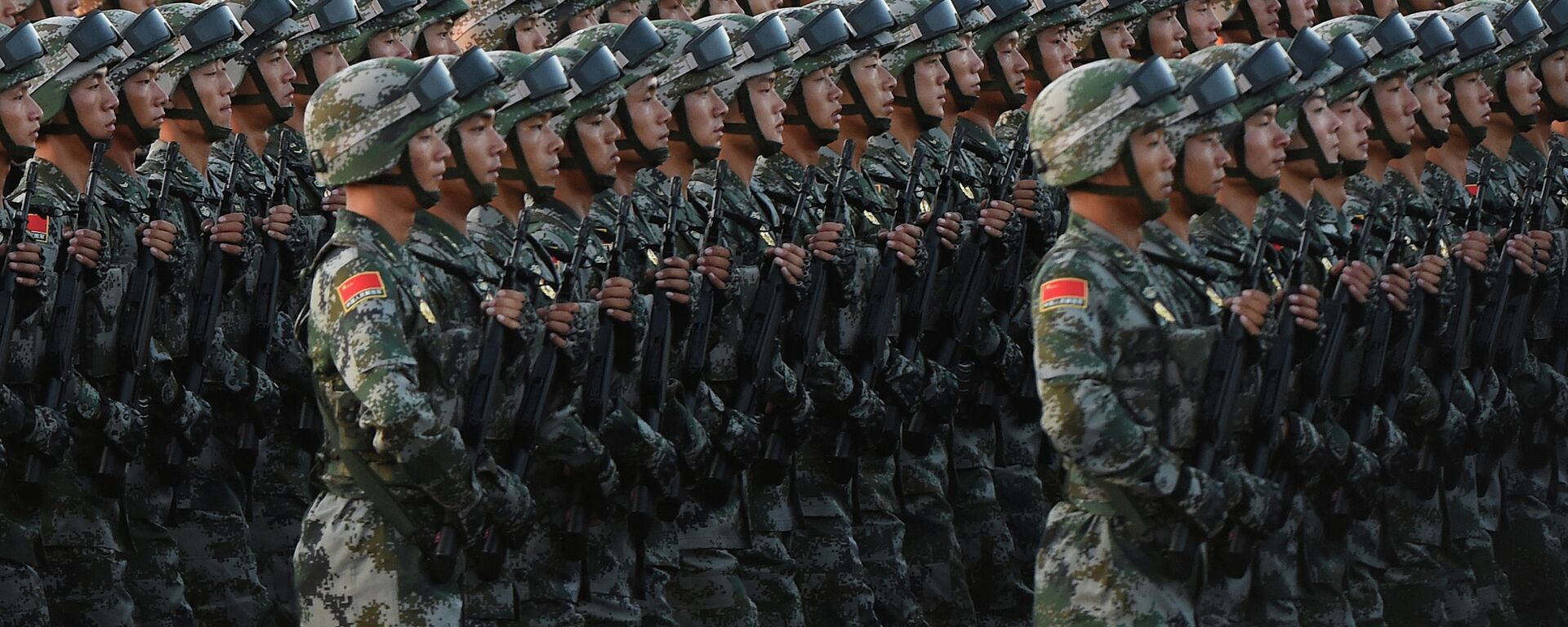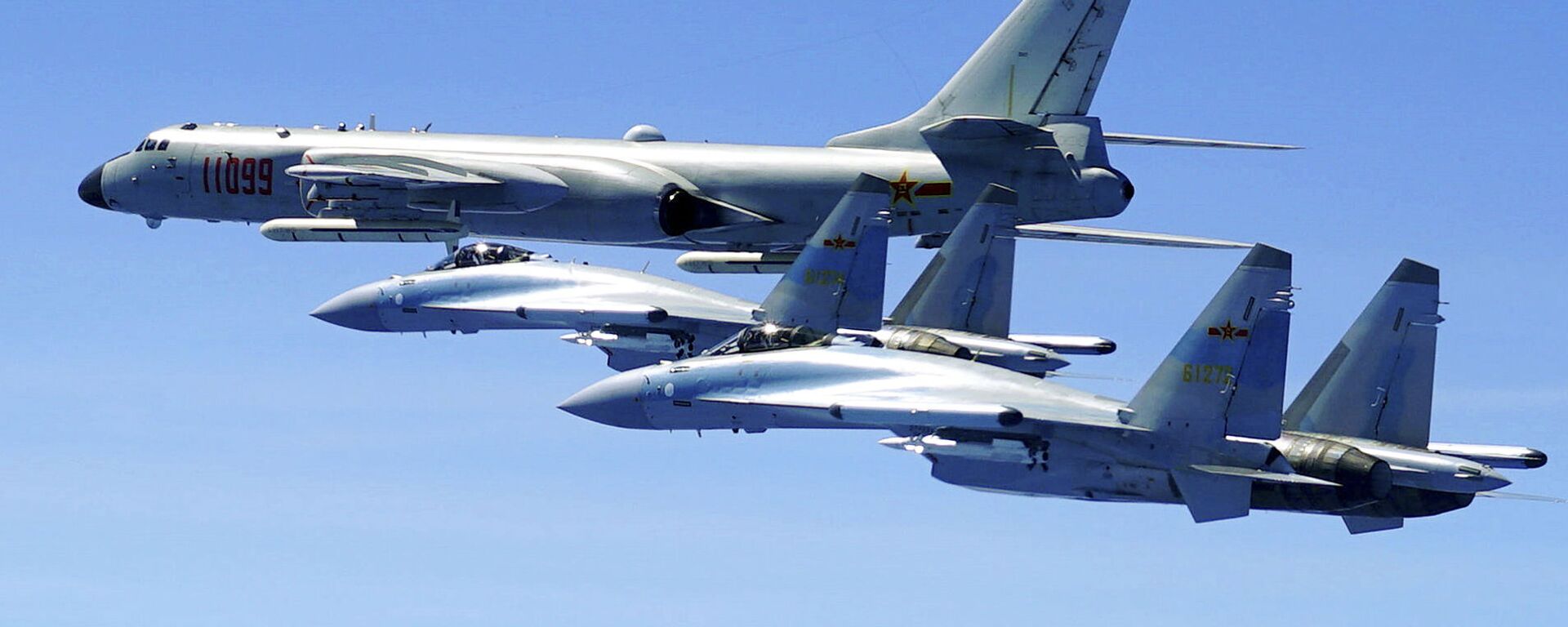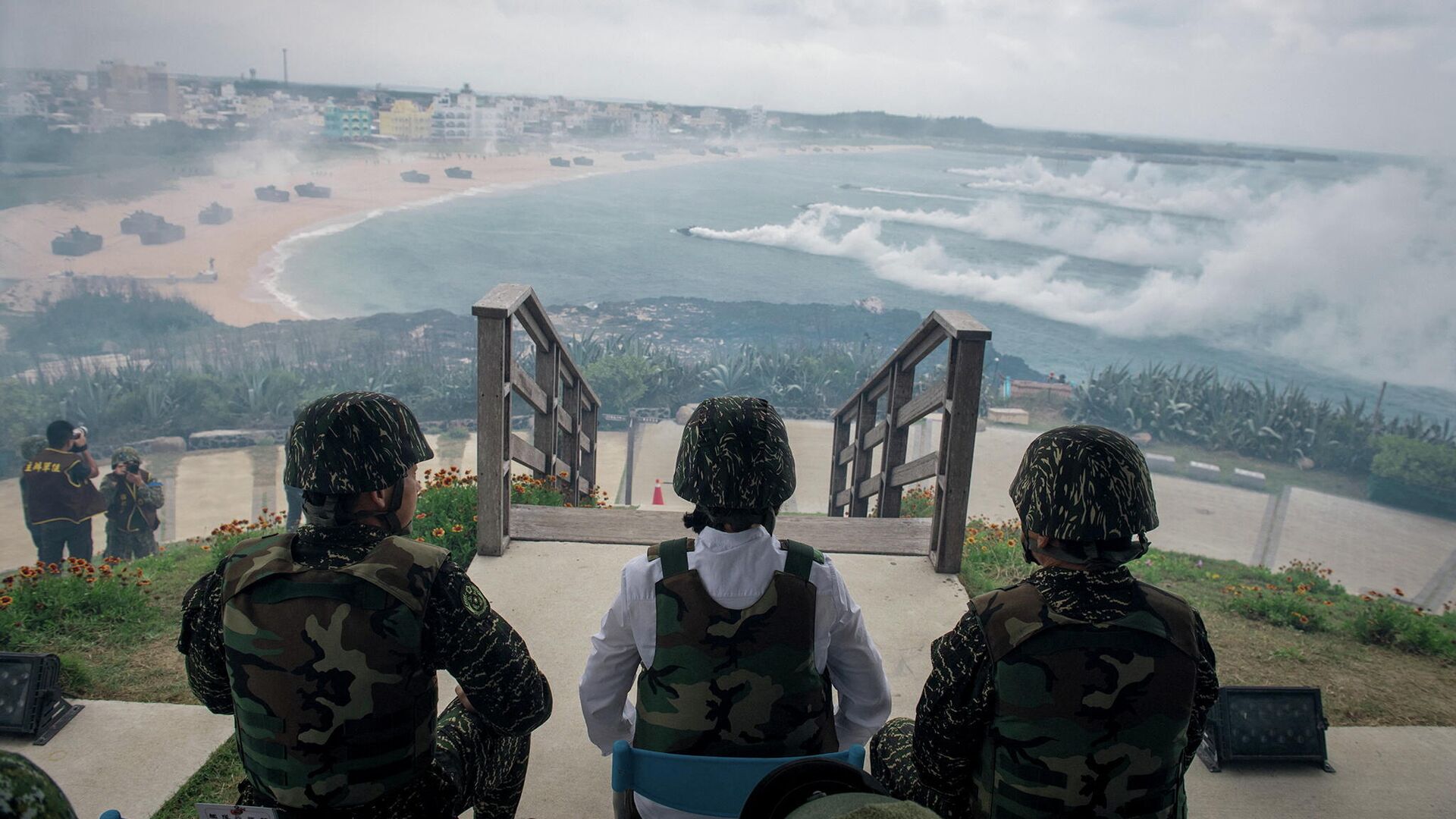https://sputnikglobe.com/20211230/china-warns-americas-actions-regarding-taiwan-expose-washington-to-unbearable-price-1091910867.html
China Warns America's Actions Regarding Taiwan Expose Washington to 'Unbearable Price'
China Warns America's Actions Regarding Taiwan Expose Washington to 'Unbearable Price'
Sputnik International
Chinese State Councilor and Foreign Minister Wang Yi has warned that the US may face consequences over its Taiwan-related actions.
2021-12-30T09:54+0000
2021-12-30T09:54+0000
2023-06-19T12:43+0000
china
lloyd austin
troops
tensions
soldiers
situation
province
us
taiwan
https://cdn1.img.sputnikglobe.com/img/07e5/0c/1e/1091906863_0:120:2048:1272_1920x0_80_0_0_e942287aa531df08f6f94b4a5ce6cadb.jpg
Chinese State Councilor and Foreign Minister Wang Yi has warned that the US may face consequences over its Taiwan-related actions.The top Chinese diplomat added that Taipei "has no other way forward other than reunification with the mainland".The remarks came after Chinese Foreign Ministry spokesman Zhao Lijian last week accused "some American forces" of stubbornly manipulating the Taiwan issue in a bid "to control China", something that he said had further "aggravated" tensions in the Taiwan Strait.According to the spokesman, Washington should "stop developing military ties with Taipei […] so as not to seriously damage Sino-US relations" and in order to maintain "peace and stability across the Taiwan Strait".He spoke after US National Security Adviser Jake Sullivan promised that America would "take every action" to prevent China from forcibly invading Taiwan.In late October, Chinese Foreign Ministry spokesman Wang Wenbin responded to US President Joe Biden's previous vow to "defend Taiwan" by urging POTUS not to underestimate China's commitment to its claims to the island."Taiwan is an inalienable part of China's territory", the spokesman stressed, adding that "the Taiwan issue is purely an internal affair of China that allows no foreign intervention".China-Taiwan Tensions In early October, China sent almost 40 fighter jets into Taiwan's air defence identification zone for two days in a row. The flights came after US and EU delegations visited the island and Taiwanese President Tsai Ing-wen admitted the presence of US troops on Taiwanese territory for training purposes during an interview with CNN.This was preceded by The Wall Street Journal reporting that US Marines and special operations forces had been secretly training Taiwan's soldiers "for more than a year".The situation has been exacerbated by the US repeatedly sending warships to the Taiwan Strait, separating the island from mainland China. Beijing dubs such missions provocations, slamming Washington as "the destroyer of peace and stability" in the Taiwan Strait and "a security risk creator in the region".Taiwan has been governed independently from Beijing since 1949. China views the island as its breakaway province, while the island's authorities maintain that it is an autonomous country. Considering the island an integral part of China, Beijing adheres to a policy of peaceful reunification under the "One China – Two Systems" model.While the US does not have formal diplomatic relations with Taiwan, Washington maintains a representative office in Taipei, remaining the island's biggest supplier of military hardware.
https://sputnikglobe.com/20211202/something-will-happen-trump-suggests-china-will-strike-taiwan-after-2022-beijing-olympics-1091185979.html
https://sputnikglobe.com/20211123/china-scrambles-warships-fighter-jets-as-us-destroyer-crosses-taiwan-strait-1090951987.html
china
taiwan
Sputnik International
feedback@sputniknews.com
+74956456601
MIA „Rossiya Segodnya“
2021
Oleg Burunov
https://cdn1.img.sputnikglobe.com/img/07e4/09/0b/1080424846_0:0:2048:2048_100x100_80_0_0_3d7b461f8a98586fa3fe739930816aea.jpg
Oleg Burunov
https://cdn1.img.sputnikglobe.com/img/07e4/09/0b/1080424846_0:0:2048:2048_100x100_80_0_0_3d7b461f8a98586fa3fe739930816aea.jpg
News
en_EN
Sputnik International
feedback@sputniknews.com
+74956456601
MIA „Rossiya Segodnya“
Sputnik International
feedback@sputniknews.com
+74956456601
MIA „Rossiya Segodnya“
Oleg Burunov
https://cdn1.img.sputnikglobe.com/img/07e4/09/0b/1080424846_0:0:2048:2048_100x100_80_0_0_3d7b461f8a98586fa3fe739930816aea.jpg
china-taiwan tensions, chinese foreign ministry, beijing's warning to washington over taiwan
china-taiwan tensions, chinese foreign ministry, beijing's warning to washington over taiwan
China Warns America's Actions Regarding Taiwan Expose Washington to 'Unbearable Price'
09:54 GMT 30.12.2021 (Updated: 12:43 GMT 19.06.2023) In early December, US Defence Secretary Lloyd Austin said that Washington remains committed to the "One-China" policy, but that it is working to "support Taiwan's ability to defend itself".
Chinese State Councilor and Foreign Minister Wang Yi has warned that the US may face consequences over its Taiwan-related actions.
Speaking to state media, Wang cautioned that by "encouraging 'Taiwan independence' forces" Washington "not only puts Taiwan into an extremely dangerous situation but also exposes the United States to an unbearable price".
The top Chinese diplomat added that Taipei "has no other way forward other than reunification with the mainland".
The remarks came after Chinese Foreign Ministry spokesman Zhao Lijian last week accused "some American forces" of stubbornly manipulating
the Taiwan issue in a bid "to control China", something that he said had further "aggravated" tensions in the Taiwan Strait.

2 December 2021, 01:10 GMT
Zhao called on Washington to adhere to the One-China principle and "be cautious in its words and deeds on Taiwan-related issues".
According to the spokesman, Washington should "stop developing military ties with Taipei […] so as not to seriously damage Sino-US relations" and in order to maintain "peace and stability across the Taiwan Strait".
He spoke after US National Security Adviser Jake Sullivan promised that America would "take every action" to prevent China from forcibly invading Taiwan.
The remarks followed US Defence Secretary Lloyd Austin stressing that even though the White House remains committed to the "One-China" policy, it is ready to resist any attempts by Beijing to use force against the island.
In late October, Chinese Foreign Ministry spokesman Wang Wenbin responded to US President Joe Biden's previous vow to "defend Taiwan" by urging POTUS not to underestimate China's commitment to its claims to the island.
"Taiwan is an inalienable part of China's territory", the spokesman stressed, adding that "the Taiwan issue is purely an internal affair of China that allows no foreign intervention".
In early October, China sent almost 40 fighter jets into
Taiwan's air defence identification zone for two days in a row. The flights came after US and EU delegations visited the island and Taiwanese President Tsai Ing-wen admitted the presence of US troops on Taiwanese territory for training purposes during an interview with
CNN.
This was preceded by The Wall Street Journal reporting that US Marines and special operations forces had been secretly training Taiwan's soldiers "for more than a year".

23 November 2021, 11:58 GMT
The situation has been exacerbated by the US repeatedly sending warships to the Taiwan Strait, separating the island from mainland China. Beijing dubs such missions provocations, slamming Washington as "the destroyer of peace and stability" in the Taiwan Strait and "a security risk creator in the region".
Taiwan has been governed independently from Beijing since 1949. China views the island as
its breakaway province, while the island's authorities maintain that it is an autonomous country. Considering the island an integral part of China, Beijing adheres to a policy of peaceful reunification under the "One China – Two Systems" model.
While the US does not have formal diplomatic relations with Taiwan, Washington maintains a representative office in Taipei, remaining the island's biggest supplier of military hardware.




